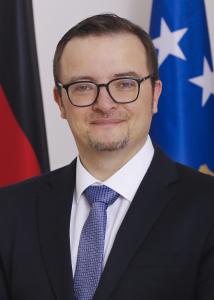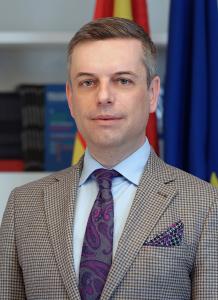Daniel Braun, the official representative of KAS in Skopje, gave an overview of the topic and initiated the discussion on several aspects related to the challenges for the transatlantic alliance in the forthcoming period. Tinko Weibezahl, Desk Officer for the North Atlantic in the Department for European and International Cooperation at KAS in Berlin, elaborated on the current crisis within the European Union, different aspects of the relations with the EU neighbourhood, enlargement challenges, as well as post-”Brexit” circumstances. In his opinion, the new US administration will certainly have an impact on the transatlantic relations, however, the US strategy towards Europe is not very likely to change. Jeremy Stern, Nonresident Senior Fellow at the Atlantic Council in Washington, analysed the relations with Europe under the administrations of the former presidents George W. Bush, Barack Obama and Donald Trump, as well as the general global situation, including the roles of China and Russia. He emphasised the need to keep the EU accession process open and to prevent other countries from undermining it.
Two former Macedonian foreign ministers also shared their views. Antonio Miloshoski, who currently chairs the Assembly's Foreign Affairs Committee, presented a retrospective on EU enlargement in the Western Balkans, pointing to past and current difficulties related to bilateral issues between some of the countries. The lack of a clear strategy on behalf of the EU, a disturbed perception of the Union among the citizens of the region, as well as the slowed up enlargement process are important challenges that the EU is facing in the Western Balkans. Nikola Poposki, who is also a former Ambassador to the EU, discussed energy security aspects and the benefits of enlargement for both the candidate countries and the EU, as well as for the transatlantic alliance. The discussion was chaired by MK91 director Vasko Naumovski, former Deputy Prime Minister and former Ambassador to the US, who summarized the views and expressed his hope to continue the discussion on this and other related topics that will provide additional input for a broader analysis of the transatlantic relations and EU enlargement.
The Konrad-Adenauer-Stiftung and its partners will continue to conduct events that unite politicians, experts and the broader public in discussions on current topics that are of high relevance for the country, the region, and the EU.






